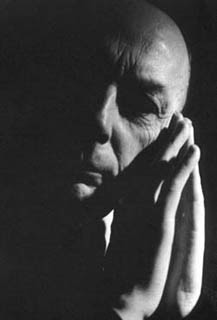
Carry Me Away
Translation by Eli Siegel
Carry me away into a Portuguese boat of once,
Into an old and gentle Portuguese boat of once,
Into the stem of the boat, or if you wish, into the foam,
And lose me, in the distance, in the distance.
Into the yoking of another time.
Into the deceiving velvet of snow.
Into the breath of some dogs brought together again.
Into the weary gathering of dead leaves.
Carry me, without breaking me, into kisses,
Into breasts that raise themselves and breathe,
On palms covering them and their smile,
Into the corridors of long bones, and of articulations.
Carry me away, or rather dig me deep.
.:::
My Pastimes
(“Mes Occupations” translated by David Lehman)
It’s the rare person I meet whom I don’t want to beat up. Others favor the interior monologue, stream-of-consciousness, art and dreams. Not me. I like to beat people up.
Now some people, unaware of my purposes, play right into my hands, sit opposite me in a grease joint, stay a while, pick their teeth, they want to eat.
Here’s one now.
Notice how swiftly I grab him by the collar. Pow! Then I do it again. Bam! Pow!
Then I hang him on the coat rack. Unhang him. Hang him. Unhang him.
Then I toss him on the table, hit him, kick him, choke him. I mean, I beat the shit out of him.
Then I spit on him. I flood him with my spit.
He revives.
I rinse him off, I stretch him out (by now I’m losing interest, this is going on too long), I crumple him up, squeeze him dry, and roll him into a ball, which I drop into my glass. Then I lift it in the air and spill it on the floor. “Waiter, get me a clean glass, will you?”
But I’m too fagged out, I pay the bill in a hurry and leave without another word.
.:::

The French writer, painter and graphic artist Henri Michaux was born in the Belgian town of Namur in 1899 and spent his childhood in Brussels. He wanted to become a priest, but followed his father's wish and began to study medicine in 1919, but soon abandoned this plan and signed on as a seaman. After reading works by Lautréamont he began writing in 1922. His acquaintance with Paul Klee, Max Ernst and Giorgio de Chirico, whom he met in Paris in 1925, inspired him to first painting and drawing attempts. Between 1927 and 1937 he travelled through South America and Asia. Afterwards Michaux sketched and painted his Phantomisms. He had his first exhibitions in Parisian galleries, followed by important shows abroad. In the mid 1950s Michaux began experimenting with hallucinatory drugs, particularly with mescaline, letting his experiences inspire his writing, painting and drawing. These works were first exhibited in 1956 at the Galerie La Hune in Paris. Then there was a large exhibition at the Palais des Beaux-Arts in Brussels in December 1957 and a retrospective exhibition organised by Daniel Cordier in Frankfurt/Main in March 1959. His ink drawings evoke scriptural elements and calligraphic symbols which are a seismographic reflection of the artist's inner emotions. The two systems of word-language and sign-language pervade each other. Michaux's impressive oeuvre attracted much international recognition. He exhibited works at the documenta 2 and 3 in Kassel in 1959 and 1964; he was awarded the Einaudi-Prize at the Biennale in Venice in 1960. Michaux's paintings always remained figurative, in-spite of all tendency towards abstraction. The artist's intention was not to flee from the world, but to expand the world by changing the awareness. The real world was to be enhanced by additional levels of perception. Henri Michaux died in Paris in 1984 at the age of 85.
No comments:
Post a Comment